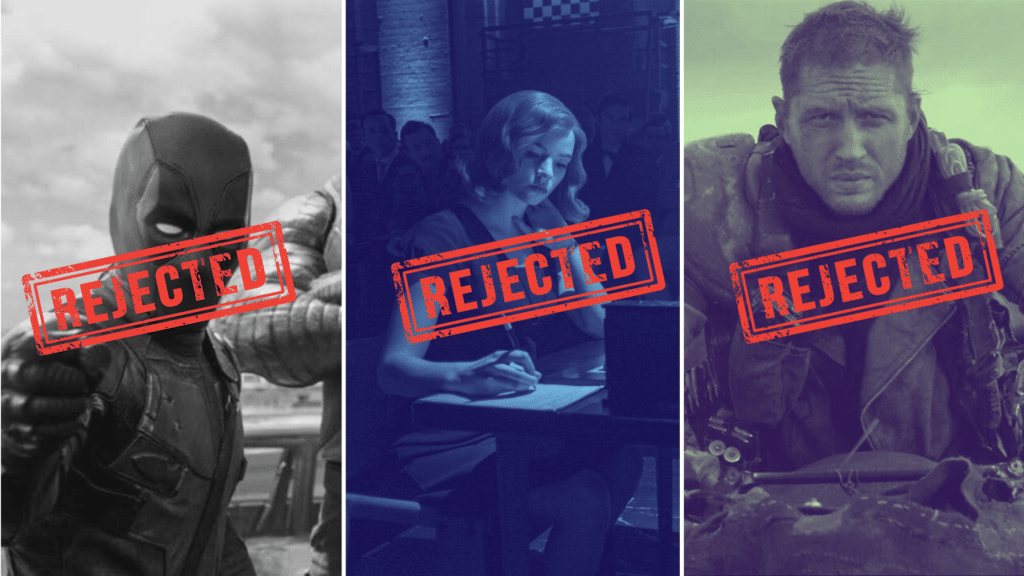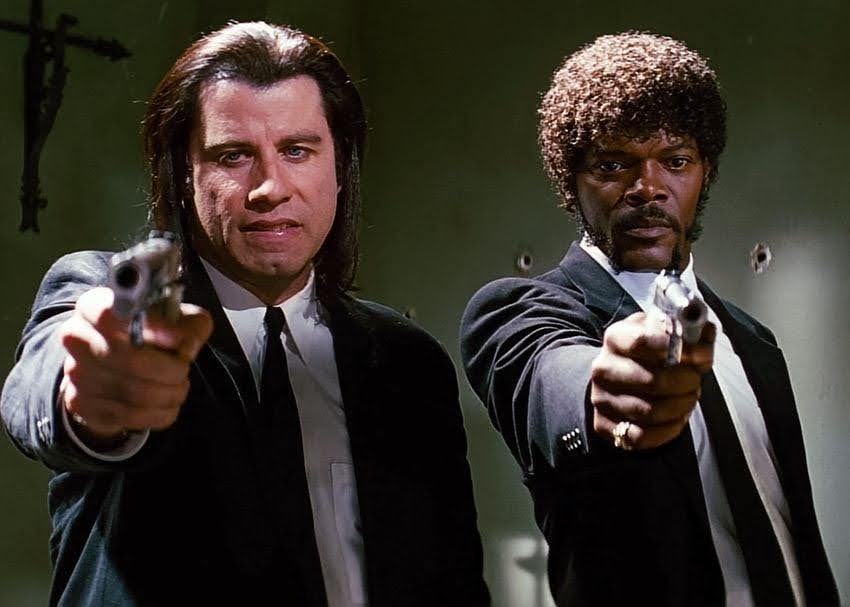
Introduction
Every screenwriter dreams of seeing their script come to life on the big screen. We work hard on our scripts, developing compelling characters and plots, hoping to wow our audiences.
We totally understand the feeling and the blood, sweat and tears, but the road to success is rarely straightforward and one of the most challenging obstacles we must overcome along the way is rejection.
When our scripts don’t sell, it can feel deeply personal and a reflection of our talent and potential as writers.
However, it’s not as straightforward as that. Rejection often has little to do with our abilities and much more to do with factors outside our control. From timing and market trends to the need for our scripts to be developed some more, it can seem like a brick wall is constantly put up in our way.
But if we learn to understand the dynamics of the film and television industry and how to navigate them, we can begin to truly aspire to the long-term success we crave.
In today’s article, we’ll explore why scripts don’t sell, share the stories of now-iconic projects that faced rejection, and give you actionable steps to turn your setbacks into stepping stones.
Why Scripts Don’t Sell
Before we go any further, let’s focus on why scripts don’t sell. What factors play into a screenplay’s success and what can stand in our way?
Timing and Market Trends
Even the most exceptional of scripts can struggle if they don’t align with current market trends. A romantic comedy may find it tricky to fit into a period when studios are focusing on superhero blockbusters.
Sometimes a more innovative story might be considered “ahead of its time”, making it difficult for producers to see its target audience.
Timing in the film industry is a tricky beast to master. The entertainment landscape is always evolving, heavily influenced by box office numbers, cultural moments, global events and in more recent times, streaming trends.
Given that it can take a long time to write a screenplay from initial idea to final draft, timing can sometimes make all the difference. A script written in one context may not resonate by the time is reaches the key decision-makers. This misalignment doesn’t mean the script lacks merit; it simply means the market isn’t ready for it – yet!

Scripts that Need Further Development
Many scripts are rejected simply because they need more work. This doesn’t mean the idea is bad, it just means the execution could be better.
Issues like pacing problems, unclear character arcs, or dialogue that doesn’t pop can all lead to rejection. Even scripts with great concepts can fall short if the story isn’t polished enough to compete in a saturated market.
For any writer, receiving feedback that your script isn’t ready can be really disheartening. However, it’s important to see it as an opportunity to improve. Writing is rewriting, and nearly every successful script has gone through multiple drafts before reaching its final form.
But always remember…
It’s Not a Reflection of Your Talent!!
If you take one thing away from today’s blog post, it should be that:
Rejection is not a reflection of your talent as a writer!
The path to success in screenwriting is rarely linear. Rejection is an inherent part of all our journeys and even the most recognized screenwriters and filmmakers faced countless dismissals before landing their big breaks.
The process of becoming a successful screenwriter isn’t about being flawless from day one but being persistent, inquisitive and growing.
Turn setbacks into opportunities — Celtx makes editing and rewrites seamless. Try it for free today!
Successful Scripts with Rocky Starts
If you still need that little ounce of persuasion that it can take time for your screenplay to land, let’s take a look at some of the most iconic films and shows we love today that didn’t have smooth beginnings.
We hope their stories are powerful reminders that perseverance truly does pay off.
Deadpool
Before Ryan Reynolds donned the red suit, broke the fourth wall and reincarnated every millennial’s favorite 90s dance routine, Deadpool and its successors were shelved projects.
Rhett Reese and Paul Wernick’s script for the original 2016 movie had been floating around for years, with studios hesitant to green light it. Executives doubted the marketability of an R-rated superhero film with a snarky, self-aware tone that regularly broke the fourth wall.
It wasn’t until test footage leaked, and audiences loved it, that Deadpool finally got its shot. You could say it was successful with a whopping $782 million at the box office, becoming the cultural phenomenon it is now.

The Queen’s Gambit
Walter Telvis’ original novel The Queen’s Gambit was first published in 1983 with the later screenplay adaptation in decades of development hell.
It was initially rejected by many studios and networks who doubted a story about chess could captivate audiences. After nearly 30 years of failed attempts, the script finally found a home on Netflix in 2020. It just goes to show that the script just needs to resonate with one person or studio who can change the course of its fortunes very quickly.
The series went on to become a global hit, winning numerous awards and sparking a surge of interest in chess.

Mad Max: Fury Road
The screenplay for the 2015 hit had an infamously troubled development process. George Miller first began working on the script in the late 1990s, but production was delayed multiple times due to budget concerns, location issues and studio worries about its marketability.
It took more than fifteen years for the movie to be completed and released. But it was worth it, becoming a commercial and critical triumph, taking away six Academy Awards and widespread acclaim.

Many scripts find success later — keep improving yours with Celtx screenwriting tools.
Pulp Fiction
Written in 1992, this cult classic even had a rocky path to production. Quentin Tarantino’s non-linear narrative and unconventional structure, plus his character choices made the script an initially hard sell in Hollywood.
Many doubted its potential, suggesting it wouldn’t find an audience. Miramax eventually green lit the project and took it on, making Pulp Fiction one of the most successful independent movies. It revitalized independent filmmaking, becoming a ground-breaking moment in cinematic history.

Still not convinced? Check out this fantastic interview from Film Courage with screenwriter Christine Conradt (Open by Christmas, On the 12th Date of Christmas) who talks openly about her experiences of rejection and how she picked herself up.
Next Steps After Rejection
While tough for all of us, rejection offers a unique opportunity for us to grow in our craft. One the initial sting wears off, here are some practical next steps to keep moving on your writing journey.
Introducing… Celtx’s Four Rs!
1. Reassess
Take a step back and reassess your screenplay. Seek feedback/coverage from trusted sources such as fellow writers, script consultants, or industry professionals. Honest critique can shed light on areas that need improvement.
If you’d prefer to submit your scripts to contests for feedback, then Coverfly and FilmFreeway are the best places to start, both one-stop shops for all competitions!
It can be helpful to ask both yourself and anyone you’re seeking feedback from, specific questions to help you root out any potential areas you may need to iron out in your script.
- Does the protagonist’s arc feel compelling?
- Is the pacing consistent and engaging?
- Are there scenes that could be streamlined or cut altogether?
Sometimes the issues holding your script back are ones that you’re too close to see. A fresh perspective from someone you trust can make all the difference.
2. Rewrite
Once you’re armed with feedback, it’s time to dive into your revisions. This could be anything from tweaking dialogue, rethinking your structure, or even reimagining the story altogether.
Be open to drastic changes – some of the most successful scripts have gone through significant overhauls before reaching the final product.
3. Revisit
We always recommend taking some time away from your screenplay from a couple of weeks to a couple of months. Returning to your screenplay with a pair of fresh eyes, you’ll be surprised how much you notice and want to amend.
It’ll only make your script better, and you’ll notice things you wouldn’t have done when you last looked at the script.
As an extreme example, earlier this year, I dug out a script I wrote over 10 years ago. I was able to find things I still loved about it but also areas where I could improve. I’ve since completed a rewrite and am excited to come back to it again in the future.
By looking at our past projects, we can not only see where we can develop, but most importantly, how far we have come!
4. Retreat
Sometimes, it’s best to set a project aside and start something completely new. This isn’t giving up but merely prioritizing our growth.
Each script you write hones your skills, making your next one even stronger. Many writers find that earlier ‘failed’ scripts (I use that term very loosely!) eventually sell once they’ve built a name for themselves with other projects. Having multiple screenplays in your portfolio is always helpful!
Moving on also help you maintain momentum in your journey. Remember, writing is a long game, and the more high-quality projects you complete, the greater your chances of success.

Building Long-Term Success
Writers who do achieve this are ones who focus on the long term, consistently improving their craft and building resilience. What techniques and habits are these writers implementing to ensure their success?
Focus on Consistent Improvement
Like all art forms, screenwriting is an evolving craft. Every script, every draft and every piece of feedback contributes to our growth as creatives.
Set aside time to study the work of other screenwriters and filmmakers. This could be reading scripts or watching films analytically, with the goal to find what works and what doesn’t. Also work out what your taste is – what is it you do and don’t like about certain movies.
Take classes in-person or online, join writing groups (like Shut Up & Write or Scribophile), and engage with the screenwriting community. The more you invest in your learning, the stronger your scripts will become.
Now, this doesn’t need to be expensive! There are so many free writing groups, online forums, software, and classes on offer. Don’t feel you have to invest thousands of dollars in a screenwriting course – there is a myriad of free resources out there.
Embrace the Process
Embrace the process of rewriting, starting new projects and experimenting with different genres and styles. The more you write, the better you’ll become. Plus, you’ll become more resilient in the face of setbacks later on.
Screenwriting can be a lonely pursuit, so have fun with it! At its heart, any kind of art form should be joyous and a way to express ourselves. Don’t take yourself too seriously – especially in the beginning!
Celebrate Small Wins
Not every success has to be a sold script or a produced film. Celebrate small victories, like completing a challenging draft, receiving positive feedback, or placing in a screenwriting competition.
These milestones are all markers of progress and should be motivation for you to keep going!
The Big Picture
Ultimately, the goal for most screenwriters isn’t just to sell their script, but to build a sustainable writing career. To do this, we must cultivate a strong, diverse portfolio, develop a professional reputation and foster great relationships within the industry.
This takes time and won’t always happen in the ways we expect. Everyone’s journey is different, so make sure to enjoy yours and hold on tight!

Conclusion
Rejection is a natural part of the screenwriting journey, but it doesn’t define your worth as a writer. Every “no” is an opportunity to learn, grow, and refine your craft.
By reassessing your script, rewriting with purpose, and starting new projects, you’ll build both skill and resilience.
Remember, the most successful writers aren’t those who avoid failure but those who persist through it. Focus on consistent improvement, celebrate small wins, and embrace the process.
With time, patience, and perseverance, you’ll not only grow as a screenwriter but will create stories that resonate with audiences and stand the test of time.
Your script’s journey doesn’t end here. Whether it’s revising, adapting, or starting fresh, Celtx is here to help.
Keep writing, and start with Celtx today!
In need of a little more guidance? Try these articles next:
- What Should the First Draft of Your Screenplay Look Like?
- How Long Does It Really Take to Write a Script?
- Script Length 101: How Many Pages Is the “Average” Movie Script?

